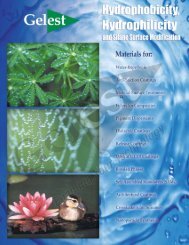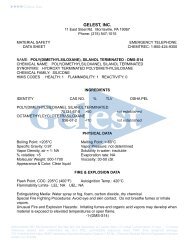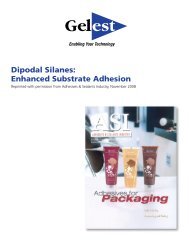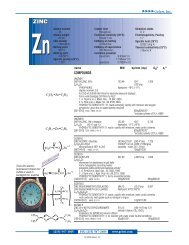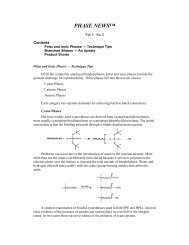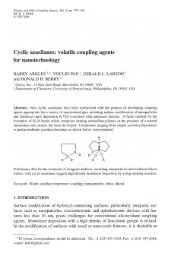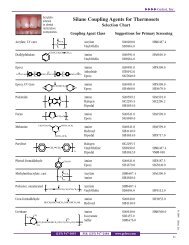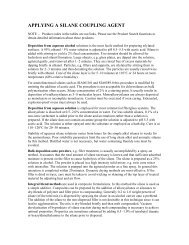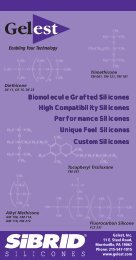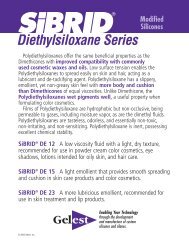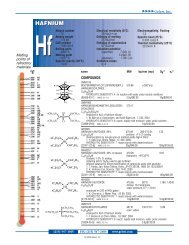Gelest Silicone Fluids - Gelest Inc.
Gelest Silicone Fluids - Gelest Inc.
Gelest Silicone Fluids - Gelest Inc.
Create successful ePaper yourself
Turn your PDF publications into a flip-book with our unique Google optimized e-Paper software.
Organic Compatible <strong>Silicone</strong> <strong>Fluids</strong><br />
Organic character is imparted to silicones by incorporating alkyl<br />
groups or aromatic substituted alkyl (aryl-alkyl) groups. The alkyl<br />
modified siloxanes more closely resemble hydrocarbons. In addition<br />
to their greater compatibility with organic materials, they have greatly<br />
improved lubrication characteristics, higher viscosity-temperature<br />
coefficients, lower compressibility and decreased oxidation stability,<br />
when compared to polydimethylsiloxanes.<br />
Polyoctylmethylsiloxane is useful as a lubricant for soft metals such<br />
as aluminum, zinc and copper. It is also useful as a rubber and plastic<br />
lubricant especially when mated against steel or aluminum. It can<br />
be employed in aluminum machining operations. It also behaves as a<br />
process aid and plasticizer in polyolefin and SEBS rubbers.<br />
As the pour point of the alkyl modified siloxanes increase, the resemblance<br />
and compatibility with hydrocarbon oils increases. Polytetradecylmethylsiloxane<br />
has a high degree of hydrocarbon compatibility and<br />
maintains liquid behavior at room temperature. Polyoctadecylmethylsiloxane<br />
and Triacontylmethylsiloxanes are creamy solids with melt<br />
points just above room temperature. They are compatible with paraffin<br />
wax, and can be used as components in thread and fiber lubricant<br />
formulations and as process aids in melt spinning. Methylalkylsiloxanes<br />
reduce surface tension of many non-aqueous solvents<br />
AlkylMethylsiloxane Homopolymers<br />
18<br />
▲<br />
▲<br />
▲<br />
▲<br />
<strong>Gelest</strong>, <strong>Inc</strong>.<br />
Viscosity Pour- Specific Refractive Surface Flashpoint Price Price Price<br />
Product Code cSt. point, °C Gravity Index Tension °C 100g 1kg 10kg<br />
polyOctylMethylsiloxane CAS: [68440-90-4]<br />
ALT-143 600-1000 -50 0.91 1.445 30.4 - $16.00 $112.00 $784.00<br />
polyTetradecylMethylsiloxane CAS: [76684-67-8]<br />
ALT-173 1500-2000 30 0.89 1.455 35.0 - $35.00 $245.00<br />
polyOctadecylMethylsiloxane CAS: [69607-75-0] (Solid at room temperature)<br />
ALT-192 250-300 (50°C) 50 0.89 (50°C) 1.443 39.5 - $16.00 $112.00 $784.00<br />
AlkylMethylsiloxane - ArylalkylMethylsiloxane Copolymers<br />
(75-85% EthylMethylsiloxane) - (15-25% 2-PhenylpropylMethylsiloxane) Copolymer CAS: [68037-77-4]<br />
ALT-213 1200-1600 - 1.01 1.462 - 209 $19.00 $148.00 $888.00<br />
(45-55% HexylMethylsiloxane) - (45-55% 2-PhenylpropylMethylsiloxane) Copolymer CAS: [68952-01-2]<br />
ALT-233 1500-2000 - 1.04 1.493 - 275 $16.00 $112.00 $784.00<br />
(94-5% DecylMethylsiloxane) - (5-6% Butylated AryloxypropylMethylsiloxane) Copolymer CAS: [68440-89-1]<br />
ALT-251 40-60 -51 0.89 1.443 26.0 316 $16.00 $112.00 $784.00<br />
(60-70% DodecylMethylsiloxane) - (30-40% 2-PhenylpropylMethylsiloxane) Copolymer CAS: [68037-76-3]<br />
ALT-263 1100-1300 - 0.91 1.464 - 277 $19.00 $148.00 $888.00<br />
AlkylMethylsiloxane DiMethylsiloxane Copolymers<br />
(27-33% OctadecylMethylsiloxane) - (DiMethylsiloxane) Copolymer CAS: [67762-83-8] (Solid at room temperature)<br />
ALT-292 230-350 40 0.89 1.440 - - $38.00 $266.00<br />
(4-6% TriacontylMethylsiloxane) - (DiMethylsiloxane) Copolymer CAS: [17725-30-0] (Solid at room temperature)<br />
ALT-563 2000-4000 (100°C) 75 0.85 1.431 - - $60.00 $420.00<br />
DiAlkylsiloxane Homopolymers<br />
DiCyclopentylsiloxane Homopolymer [R&D only]<br />
ALT-652 200-300 - 1.03 1.488 - - $160.00<br />
MANUFACTURERS OF SILANES AND SILICONES<br />
CH3<br />
(CH2)p<br />
Si<br />
CH3<br />
allowing them to act as wetting and leveling agents in coating and ink<br />
formulations. Aromatic substitution extends stability and compatibility<br />
of alkylsiloxanes.<br />
Aryl-alkyl silicones exhibit an extended range of organic compatibility<br />
and lubricity when compared to dimethyl silicones. They behave as<br />
broad spectrum compatibilizing agents for silicone/hydrocarbon/fatty<br />
acid formulations in the lubricant and cosmetic industries. They are<br />
also used as lubricants for die cast metals such as zinc and aluminum<br />
and soft metals such as copper and bronze. The incorporation<br />
of butylated aryloxypropyl units dramatically improves oxidation<br />
stability. Copolymers of this type are used as lubricants in sintered<br />
metal bearings for fans and motors, hydraulic fluids and process fluids<br />
for aluminum extrusions. <strong>Fluids</strong> with methyl and 2-phenylpropyl<br />
groups maintain excellent release properties without interfering with<br />
paintability, making them preferred in mold release agent formulations<br />
for rubber and plastics and die casting. Other uses for organic<br />
compatible silicone fluids include surfactants for de-airing molded<br />
urethane and epoxy parts during fabrication and die-cast metal<br />
lubrication. Alkylsiloxane-dimethylsiloxane copolymers are readily<br />
miscible with many hydrocarbons, introducing silicone properties to<br />
hydrocarbons. Smart fluids can be formulated with low viscosity<br />
organic siloxanes such as Dicyclopentylsiloxane.<br />
O<br />
n<br />
CH3<br />
CH<br />
CH2<br />
Si<br />
CH3<br />
O<br />
m<br />
R<br />
Si<br />
CH3<br />
O<br />
n


